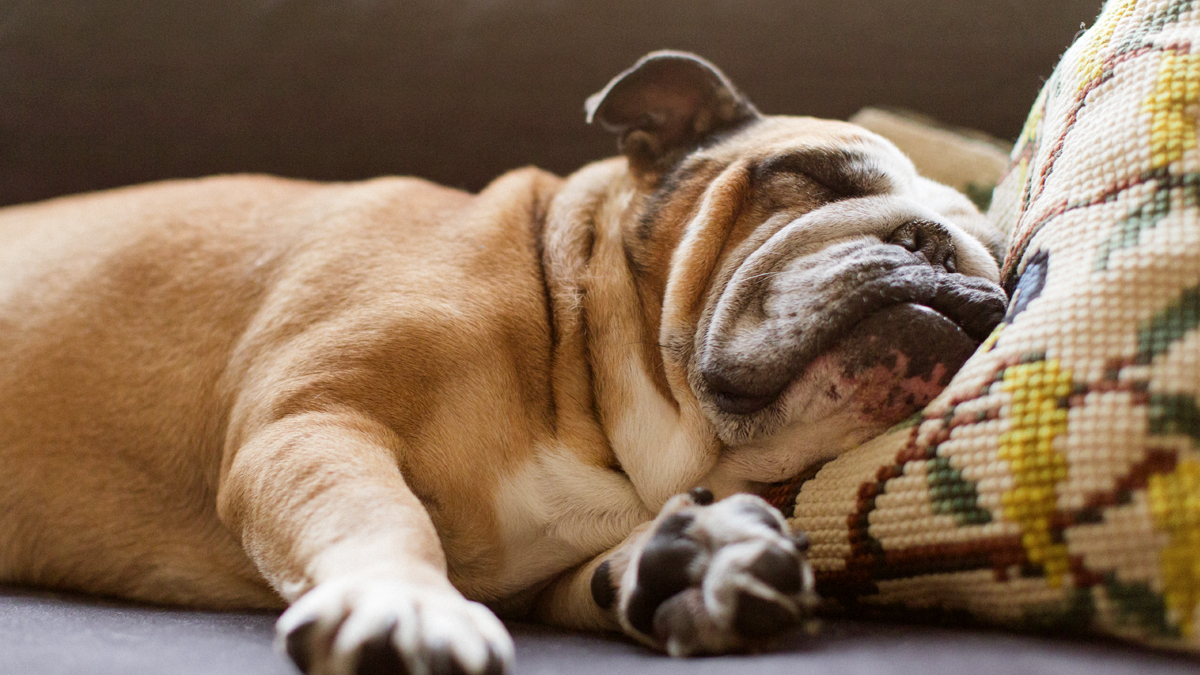Dogs, our loyal companions, often exhibit fascinating behaviors during sleep, including twitching. While some twitching is normal, it’s important to understand the underlying causes and when to seek veterinary attention.
In this article, we’ll delve into the intriguing world of canine sleep patterns, exploring the different stages of sleep and the potential reasons behind twitching. We’ll also provide guidelines for managing normal twitching and discuss when it’s crucial to consult a veterinarian.
Dog’s Sleep Patterns
Dogs, like humans, go through various stages of sleep. Understanding these stages can help us better comprehend their sleeping habits and identify any potential sleep disturbances.
Dogs typically have two main types of sleep: non-rapid eye movement (NREM) sleep and rapid eye movement (REM) sleep.
NREM Sleep
NREM sleep is further divided into three stages:
- Stage 1 (N1): This is the lightest stage of sleep, where dogs are easily awakened. Their breathing and heart rate slow down, and their muscles relax.
- Stage 2 (N2): This stage is characterized by deeper sleep, with slower breathing and heart rate. Dogs may twitch their muscles or paws during this stage.
- Stage 3 (N3): This is the deepest stage of NREM sleep, where dogs are difficult to awaken. Their breathing and heart rate are at their slowest, and their muscles are completely relaxed.
REM Sleep
REM sleep is the stage where dogs dream. Their eyes move rapidly under their closed eyelids, and their breathing and heart rate increase. Dogs may also vocalize or twitch their limbs during this stage.
Sleep Patterns in Different Breeds
The sleep patterns of dogs can vary depending on their breed. Some breeds, such as greyhounds, are known for being very active sleepers, while others, such as bulldogs, are known for being very heavy sleepers.
The size of the dog can also affect their sleep patterns. Smaller dogs tend to sleep more than larger dogs, and they may also have more frequent REM sleep episodes.
Twitching During Sleep
Dogs often twitch during sleep, and it is usually a normal part of their sleep cycle. However, excessive or unusual twitching can sometimes indicate an underlying medical condition.
There are two main types of twitches that dogs exhibit during sleep:
– Myoclonic twitches are sudden, involuntary muscle contractions that can occur in any part of the body. These twitches are usually brief and occur during the REM (rapid eye movement) stage of sleep, when the dog is dreaming.
– Clonic twitches are more sustained and rhythmic muscle contractions that can occur in one or more parts of the body. These twitches are usually associated with non-REM sleep, when the dog is in a deeper stage of sleep.
Potential Causes of Twitching
There are a number of potential causes of twitching in dogs during sleep, including:
– Normal physiological processes: Twitching during sleep is a normal part of the sleep cycle for most dogs. It is thought to be caused by the brain’s activity during dreaming, as the dog’s muscles move in response to the images and sensations that it is experiencing in its dream.
– Underlying medical conditions: In some cases, twitching during sleep can be a sign of an underlying medical condition, such as:
– Epilepsy: Twitching is a common symptom of epilepsy in dogs. If your dog is experiencing frequent or severe twitching during sleep, it is important to take them to the vet for evaluation.
– Narcolepsy: Narcolepsy is a neurological disorder that causes excessive daytime sleepiness and sudden muscle weakness. Dogs with narcolepsy may experience twitching during sleep as a result of the sudden loss of muscle tone.
– Parasites: Parasites, such as worms and fleas, can cause twitching in dogs during sleep. This is because the parasites can irritate the dog’s skin and cause them to scratch or twitch in an attempt to relieve the itching.
Differentiating Between Normal and Abnormal Twitching
It can be difficult to differentiate between normal and abnormal twitching in dogs during sleep. However, there are a few things that you can look for to help you make a determination:
– Frequency and severity: Normal twitching is usually brief and occurs only occasionally. If your dog is experiencing frequent or severe twitching, it is more likely to be a sign of an underlying medical condition.
– Duration: Normal twitching usually lasts for only a few seconds. If your dog’s twitching lasts for more than a few minutes, it is more likely to be a sign of an underlying medical condition.
– Other symptoms: If your dog is experiencing other symptoms, such as seizures, vomiting, or diarrhea, it is more likely to be a sign of an underlying medical condition.
If you are concerned about your dog’s twitching during sleep, it is important to take them to the vet for evaluation. The vet will be able to determine if the twitching is normal or a sign of an underlying medical condition.
Causes of Twitching

Twitching in dogs during sleep can be caused by various medical conditions, including seizures, neurological disorders, and pain. It’s important to rule out any underlying medical issues that may be contributing to the twitching.
Seizures
Seizures are a common cause of twitching in dogs. They are characterized by involuntary muscle contractions that can range from mild to severe. Seizures can be caused by a variety of factors, including epilepsy, head injuries, and poisoning.
Symptoms of seizures in dogs include:
- Twitching or jerking movements
- Loss of consciousness
- Drooling
- Chewing motions
- Urination or defecation
Neurological Disorders
Neurological disorders can also cause twitching in dogs. These disorders affect the brain and nervous system, and can lead to a variety of symptoms, including twitching, tremors, and seizures.
Some common neurological disorders that can cause twitching in dogs include:
- Epilepsy
- Meningitis
- Encephalitis
- Brain tumors
Pain
Pain can also cause twitching in dogs. This is because pain signals can travel through the nervous system and trigger muscle contractions. Pain can be caused by a variety of factors, including injuries, arthritis, and infections.
Symptoms of pain in dogs include:
- Twitching or jerking movements
- Limping
- Whining or crying
- Aggression
- Hiding
Management of Twitching

Management of twitching in dogs involves addressing the underlying cause and providing comfort to the dog. For normal twitching, simple measures like providing a comfortable sleeping environment and avoiding excessive stimulation before bedtime can help.
However, if twitching is excessive, persistent, or accompanied by other symptoms, veterinary attention is necessary. The veterinarian will perform a thorough examination and may recommend diagnostic tests to determine the underlying cause.
Treatment Options
Treatment options for underlying medical conditions that cause twitching depend on the specific diagnosis. Common treatments include:
- Medications: Anticonvulsants or muscle relaxants may be prescribed to control seizures or muscle spasms.
- Surgery: In rare cases, surgery may be necessary to correct anatomical abnormalities or remove tumors that are causing twitching.
- Behavioral therapy: If twitching is related to anxiety or stress, behavioral therapy can help the dog cope with these triggers.
- Environmental modifications: Reducing environmental stressors and providing a calm and comfortable environment can help minimize twitching.
Final Conclusion
In conclusion, dogs’ twitching during sleep can stem from various causes, both physiological and medical. While most twitching is harmless, it’s essential to observe your dog’s behavior and seek veterinary advice if you notice any unusual or excessive movements. Understanding the reasons behind twitching empowers us to provide the best care for our beloved canine friends, ensuring their peaceful slumber and overall well-being.
FAQ Summary
Is it normal for dogs to twitch in their sleep?
Yes, occasional twitching during sleep is normal for dogs and is often associated with dreaming or REM (rapid eye movement) sleep.
What are the different types of twitches in dogs?
Twitches can range from subtle muscle movements to full-body jerks or paddling motions.
How can I differentiate between normal and abnormal twitching?
Normal twitching typically occurs during REM sleep, is brief, and doesn’t disrupt your dog’s sleep. Abnormal twitching may be more frequent, intense, or accompanied by other symptoms.
What medical conditions can cause twitching in dogs?
Twitching can be a symptom of seizures, neurological disorders, pain, or other underlying medical conditions.
When should I seek veterinary attention for my dog’s twitching?
If the twitching is excessive, persistent, or accompanied by other symptoms such as lethargy, vomiting, or seizures, it’s important to consult a veterinarian.




